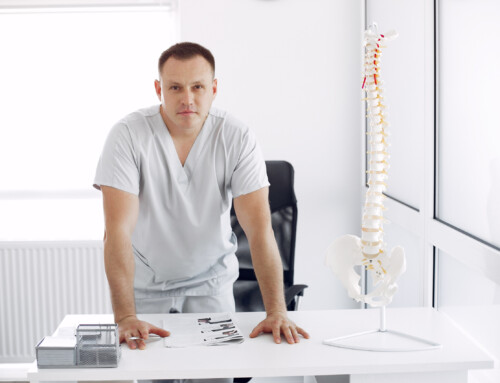Are you struggling with neck pain and aren’t sure where it came from or what you should do about it? You’re not alone, as it is one of the most common musculoskeletal disorders.
However, you’ve come to the right place.
We can help you figure out what’s causing your pain and when you should be calling your doctor. Read on below to find out!
Causes of Stiff Neck Pain
The main symptom of having a stiff neck is the inability to turn your head to a specific side. It can range in pain from feeling like a small annoyance to being unbearably sharp. Either way, your range of motion will likely be significantly reduced.
Everyday Activities
If you’re experiencing symptoms of a stiff neck, it’s likely that the cause is something common and normal. You could have possibly strained it by…
- Sleeping in the wrong position
- Slouching
- Looking down at your phone for long periods
- Moving your head in a repetitive motion for a sport (like swimming)
- Tripping and falling
You may experience a stiff neck from something as small as holding your neck in an odd position for an extended period of time. If this is the case for you, it’s no great cause for concern, and you most likely will be able to take care of it at home with time.
Whiplash
Whiplash is a more concerning cause of neck pain because it involves trauma to several different parts of your neck. Whiplash could occur from a car accident, a sports injury, or even a fall.
It can be easier to self-diagnose this if you’re aware of an accident you’ve been in recently. In addition to neck pain, symptoms of whiplash often include…
- Headaches
- Dizziness
- Arm tingling/numbness
- Fatigue
- Memory issues
- Back and shoulder pain
In this instance, it’s best to seek treatment as you could have a more serious neck injury. You want to be sure that your bones are okay, and you may need a treatment plan for your muscles and ligaments.
Less Common Issues
If the first two causes don’t seem to fit your situation, it could be something more serious. There may be a disorder with your cervical spine or disease that you shouldn’t ignore.
Arthritis
Also known as, cervical spondylosis, arthritis causes tingling in the arms and legs, difficulty with walking, and bowel/bladder issues. It can also cause headaches and weakness in your extremities.
This is more common in adults over the age of 60. In fact, over 85% of those adults suffer from cervical spondylosis. However, it’s definitely not as common in younger adults.
Herniated Disc
If you have a herniated disc in your neck, you’re probably experiencing numbness and tingling, weakness, and, most obviously, pain. That’s because it’s likely pushing on a nerve, but you could also have no symptoms.
Then again, if that was the case for you, you probably wouldn’t be here. These most commonly happen in the back, however, so you would need a spinal image to confirm.
Meningitis
Meningitis is an infection that causes swelling of the meninges, which surround your brain and spinal cord. In addition to headaches and neck pain, you will likely have a fever.
This infection mimics the flu with nausea and a high fever. It’s also possible to suffer confusion and seizures.
This is a cause for immediate concern. Anyone concerned they may be suffering from meningitis needs to contact their doctor right away.
Types of Pain Treatments
In many cases, a stiff neck can be treated at home with some inexpensive and easy remedies. It often won’t go away overnight, but, after a few days, you should be back to normal.
Heat and Ice
Alternating heat and ice every 20 minutes can help alleviate some of the pain and muscle tension in the neck. Try to get this treatment started as soon as possible to see the best results. Usually within the first 24 hours of noticing your stiff neck is best.
Rest
Take it easy on your neck and muscles. Limit whatever activity caused the sprain or strain in the first place. Otherwise, you run the risk of causing muscle spasms.
Unless a doctor has told you otherwise, you shouldn’t remove activity completely. Inactivity could result in weakness. Use caution and follow your body’s signals.
You could also try some very gentle stretching. Very slowly, move your head side to side to ease any stiffness. A physical therapist would help you with the right exercises.
At this time, it’s important that you destress as well. Stress causes your muscles to tighten and also can cause tension headaches.
OTC Medications
Anti-inflammatory medications like ibuprofen can help reduce swelling and mask some of the pain you’re experiencing. Always check that this doesn’t interfere with any other medications you’re taking. Consult your doctor.
Massage
Once the initial pain has declined, seeing a massage therapist is a good option to reduce tension in your neck and shoulders. You could have a buildup from your normal activities.
If you’re sitting or standing with bad posture, your muscles get used to it. Muscles often pull the spine into uncomfortable positions leading to spinal problems. Seeing a massage therapist can help.
When to See a Doctor
If your condition seems to be worsening or not getting better after a week, it’s time to get an appointment with your doctor. Contact your doctor at any point when you feel uncomfortable with your neck pain and would like a medical opinion.
They can give you peace of mind about what’s going on and develop a treatment plan for you. If you’re in need of assistance, Wake Spine and Pain can help. Check out our locations to find pain clinics near you.







